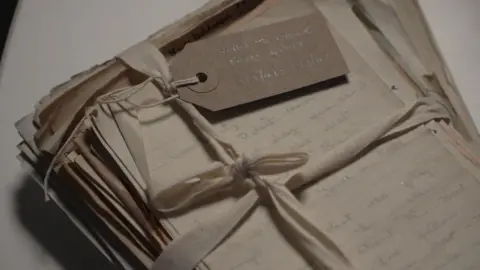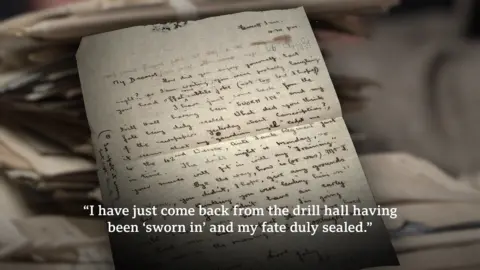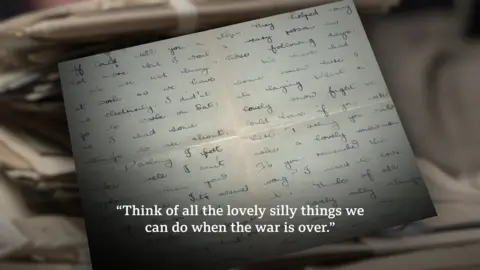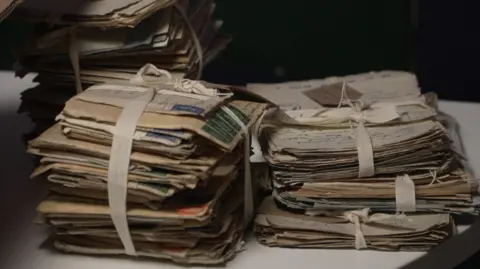WW2 letters show burgeoning love with war backdrop
 BBC
BBC"My darling Lita, I just can't realise that the war in Europe is over."
On VE Day 1945, John Quick wrote to his girlfriend Ellen Melita Lamb - who he had met seven years earlier in Portsmouth, and affectionately called either Lita or Nellie.
The letter is part of a collection of wartime correspondence between the couple that were discovered several decades later in a "junk shop" on the south coast by Matt Wingett.
They have now been shared with the BBC as part of celebrations to mark 80 years since the defeat of Nazi Germany, and tell the story of the near-six year conflict at home and abroad through the eyes of the young lovers.
Mr Wingett said the letters told the "really extraordinary story of these two young people who meet each other on the corner of St Paul's Road [in Portsmouth] in late 1938, and build a friendship and a relationship which lasts through separation, death, war - the whole thing".
"There are moments in some of the letters, especially later on in the war, where he's been posted to north Africa and then to Europe where he says to her 'It's my connection with you that keeps me going' - which is just quite extraordinary," he said.

Teenagers John and Ellen began exchanging letters soon after they met in Portsmouth in 1938, with his enlistment in the army months later a hot topic.
"I have just come back from the drill hall having been 'sworn in' and my fate duly sealed," one letter he wrote to her said.
As John started his training, Ellen wrote to him saying: "This last week I've felt very lonely, why I don't know I've been to the flicks etc, but it doesn't make any difference."
Mr Wignett said the early correspondence between the pair was about "very kind of light stuff going on".

But by late 1940, the tone had changed and Ellen was urging John to take care, writing: "Don't for goodness sake get in the way of a bomb."
It was in fact Ellen that was almost killed during the Portsmouth blitz, when a bomb went off close to her home.
"The house where they're living is destroyed, not by a direct hit, but by what she calls a 'time-bomb' that fell on a house about three doors down," Mr Wignett said.
She ended a letter to John about her lucky escape with the words: "Think of all the lovely silly things we can do when the war is over."

By 1942 John and his Royal Artillery unit were in Egypt, before then travelling to Italy, where the Allies were steadily advancing.
He was in Italy when the war ended, and in his VE Day letter he told Ellen: "How I should love to be in England now. Darling, you must tell me all about it."
Mr Wignett said: "Incredibly, reading this section I was thinking 'did he make it? did he make it all the way through?', because of course it's Victory in Europe Day, but he's still rounding up SS officers who are hiding out in the woods in Italy."
"Then there's a gap in the letters, and then the next letter said 'To my darling wife', and that was in September 1945."

John did eventually make it home, where he and Ellen married "straight away", before he was posted back out to Italy, according to Mr Wignett.
The last letter in the collection was written eight years later, in 1953.
"What happens from 1953 onward? I'd really like to know, because it is an extraordinary love story," Mr Wignett said.
As the nation commemorates the 80th anniversary of VE Day, he is hoping to find out what life after the war looked like for John and Ellen - and to see if the pair got to do all of the "lovely silly things" Ellen dreamt of doing in peacetime.
You can follow BBC Hampshire & Isle of Wight on Facebook, X (Twitter), or Instagram.
